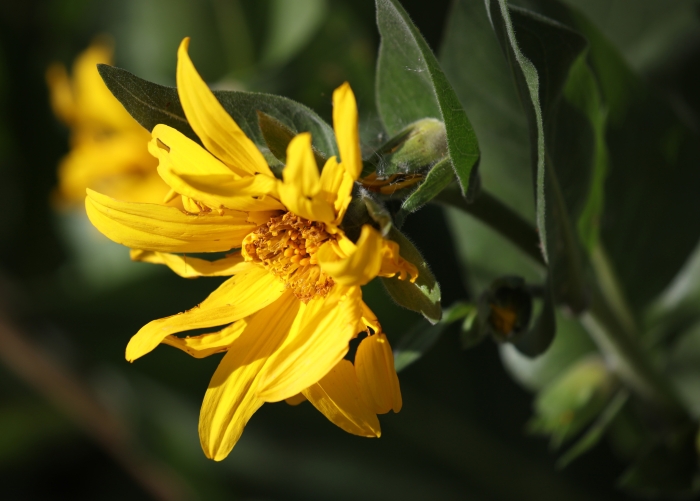Mule-Ears
(Wyethia amplexicaulis)
Mule-Ears (Wyethia amplexicaulis)
/
/

Steve Waslo
CC BY 4.0
Image By:
Steve Waslo
Recorded By:
Copyright:
CC BY 4.0
Copyright Notice:
Photo by: Steve Waslo | License Type: CC BY 4.0 | License URL: http://creativecommons.org/licenses/by/4.0/ | Rights Holder: Steve Waslo | Publisher: iNaturalist | Date Created: 2020-06-07T18:08:46-07:00 |





















Estimated Native Range
Summary
Wyethia amplexicaulis, commonly known as Mule-Ears, is a deciduous perennial herb native to open woodlands, meadows, and dry slopes in the Western United States, particularly in the Rocky Mountains and the Sierra Nevada. It typically grows to a height of 3 feet (0.9 meters) and a width of 1-2 feet (0.3-0.6 meters). Mule-Ears is characterized by its large, basal leaves that resemble the ears of a mule, and its showy, bright yellow, sunflower-like flowers that bloom in late spring to early summer. The plant’s appearance adds a splash of color to wildflower meadows and naturalistic garden settings.
Mule-Ears is valued for its ease of maintenance and drought tolerance once established, making it suitable for xeriscaping and native plant gardens. It is often used in restoration projects and as an ornamental in dry, sunny borders. This plant prefers full sun exposure and thrives in well-drained soils, though it can tolerate a range of soil types. While generally pest-free, it can be susceptible to root rot if overwatered. Mule-Ears is not known for aggressive roots or significant disease problems, but it can be difficult to transplant due to its taproot system.CC BY-SA 4.0
Mule-Ears is valued for its ease of maintenance and drought tolerance once established, making it suitable for xeriscaping and native plant gardens. It is often used in restoration projects and as an ornamental in dry, sunny borders. This plant prefers full sun exposure and thrives in well-drained soils, though it can tolerate a range of soil types. While generally pest-free, it can be susceptible to root rot if overwatered. Mule-Ears is not known for aggressive roots or significant disease problems, but it can be difficult to transplant due to its taproot system.CC BY-SA 4.0
Plant Description
- Plant Type: Herb
- Height: 2-3 feet
- Width: 1-2 feet
- Growth Rate: Moderate
- Flower Color: Yellow
- Flowering Season: Spring
- Leaf Retention: Deciduous
Growth Requirements
- Sun: Full Sun
- Water: Medium
- Drainage: Medium, Fast
Common Uses
Bee Garden, Butterfly Garden, Drought Tolerant, Fire Resistant, Low Maintenance, Showy Flowers
Natural Habitat
Open woodlands, meadows, and dry slopes
Other Names
Common Names: Mulesears Wyethia, Mule’s Ear Wyethia, Mulesear Wyethia
Scientific Names: , Wyethia amplexicaulis, Wyethia amplexicaulis subsp. major, Wyethia lanceolata, Espeletia amplexicaulis, Wyethia amplexicaulis subsp. amplexicaulis, Wyethia amplexicaulis subsp. subresinosa, Wyethia major, Wyethia subresinosa,
GBIF Accepted Name: Wyethia amplexicaulis (Nutt.) Nutt.